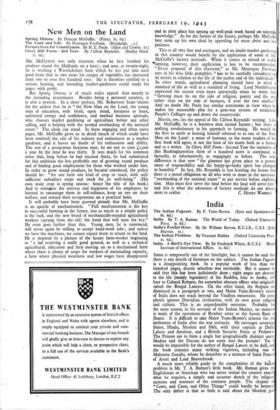New Men on the Land
Spring Onions. By Duncan McGuffie. (Faber. 7s. 6d.) The Land and Life. By Montague Fordham. (Routledge. r,s.) Perspectives for Countrymen. By H. E. Poole. (Allen and Unwin. 2s.) Glory Hill Farm : 2nd Year. By Clifton Reynolds. (Bodley Head.
7s. 6d.)
MR. MCGUFFIE was only nineteen when he first hawked his produce round the Midlands on a lorry ; and now, at twenty-eight, he is working a Warwickshire farm which he has put into such good heart that in two years his output of vegetables has increased from two to over five hundred tons. He is therefore entitled to a serious hearing, and intending market-gardeners could study his pages with profit.
But Spring Onions is of much wider appeal than merely to the intending practitioner. Besides being a personal narative, it is also a portent. In a short preface, Mr. Robertson Scott' claims for the author that he is " the New Man on the Land, the young man of education, with fresh, open mind, keenness to learn, unlimited energy and confidence, and marked business aptitude, who chooses market gardening or agriculture before any other calling, and is helping with the needed overhauling of the national estate." The claim can stand. In these engaging and often naive pages, Mr. McGuffie gives us in detail (much of which could have been omitted) the tale of his ardours and endurances as a market gardener, and it leaves no doubt of his enthusiasm and ability. The son of a prosperous business man, he set out to earn ki,000 a year by the time he was thirty. It says much for his common sense that, long before he had reached thirty, he had substituted for this ambition the less profitable one of growing sound produce and of finding good employment for those who worked under him. In order to grow sound produce, he became convinced, the policy should be : " for one farm one kind of crop or stock, with only sufficient subsidiary crops and stock for its well-being." (His own main crop is spring onions: hence 'the title of his book.) And to stimulate the interest and happiness of his employees he learned to encourage them in self-reliance, keep an eye on their welfare, and reward their co-operation on a practical basis.
It will probably have been guessed already that Mr. McGuffie is an apostle of mechanisation. " Full mechanisation is the key to successful farming in the future, just as much as a simple policy is the lock, and the new breed of mechanically-minded agricultural workers (sprung from the -old) the hand that will turn the key." He even goes farther than this. Young men, he is convinced, will never again be willing to accept hand-work jobs ; and unless we have the machines, we cannot expect them to return to the land. He is ihspired by a picture of the future farm-worker beginning as " a lad receiving a really good general, as well as a technical agricultural, education and then moving on to a mechanised farm where there is plenty of scope for workers of outstanding capacity, a farm where physical weariness and low wages have disappeared
and in their place has sprung up well-paid work based on scientific knowledge." As for the farmer of the future, perhaps Mr. McGuffie best sums up his own ideal by appealing for more drive and less patience.
This is all very fine and astringent, and no doubt market gardening in this country would benefit by the application of some of Mr.
McGuffie's factory methods. When it comes to mixed or arable *farming, however, their application is less to be recommended. "Every proposal of this character," as Mr. Montague Fordham says in his wise little pamphlet, -" has to be carefully considered on its merits in relation to the life of the nation and of the individuals," In other words, agricultural planning should have in mind a standard of life as well as a standard of living. Lord Northbourne expressed the matter even more universally when he wrote that "farming must be on the side of religion, poetry and the arts rather than on the side of business, if ever the two conflict." And no doubt Mr. Poole has similar sentiments in view when he makes his reasonable plea for a post-war system of residential People's Colleges up and down the countryside.
Herein, too, lies the appeal of Mr. Clifton Reynolds' writing. Like Mr. McGuffie, he is a business man turned farmer ; but there is nothing revolutionary in his approach to farming. He would be the first to smile at hearing himself referred to as one of the New Men on the Land : a sense of humour, as the many readers of his first book will agree, is not the least of his assets both as a farmer and as a writer. In Glory Hill Farm : Second Year the narrative of this Buckinghamshire farm of a hundred acres is continued, as factually, as informatively, as engagingly as before. The once. difference is that now " the glamour has given place to a greater sense of responsibility and the happy-go-lucky spirit has changed to humility." In fact, Mr. Reynolds is fast leartiing the lesson that there is a moral obligation on all who wish to share in the necessary "overhauling of the national estate" to put service before exploita- tion. Man must first serve the land before the land will serve him : and this is what the advocates of factory methods do not alway


























 Previous page
Previous page